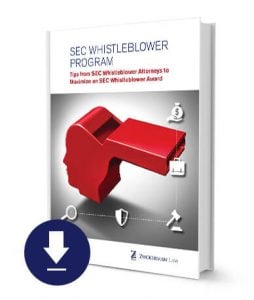The SEC Continues to Root Out Insider Trading
Insider trading occurs when an individual buys or sells a security, in breach of a fiduciary duty or other relationship of trust and confidence, while in possession of material, nonpublic information about the security. The SEC continues to focus its enforcement efforts on identifying and halting insider trading violations. Annually, the SEC brings a significant number of its enforcement actions against individuals who:
- tip material, nonpublic information;
- trade securities based on tipped information; or
- trade securities based on misappropriated information.
In FY 2018, insider trading constituted approximately 10% of the SEC’s 490 stand-alone cases (51 actions against 56 individuals). This included charging a former NFL player and former investment banker with insider trading that resulted in more than $1.2 million in illegal profits. The SEC created a timeline of the insider trading that led to the enforcement action, demonstrating that the SEC will not be duped by coded text messages about illegal trades.
New Technology and Whistleblower Tips Root Out Insider Trading
The SEC relies on technological developments to accomplish its enforcement goals, including identifying and pursuing insider trading cases. In FY 2018, the SEC implemented a Consolidated Audit Trail, intended to enhance, centralize, and update the regulatory data infrastructure available to market regulators. Once fully implemented, the Consolidated Audit Trail will give regulators quicker access to all trade and order data, facilitating the detection of illegal trading practices, such as insider trading.
In addition to technology, the SEC has increasingly relied on whistleblower tips to identify and halt insider trading. According to a recent report, the SEC receives hundreds of tips each year related to insider trading violations:
- FY 2015: 273 insider trading tips
- FY 2016: 262 insider trading tips
- FY 2017: 231 insider trading tips
- FY 2018: 262 insider trading tips
These tips can lead to multi-million dollar awards under the SEC Whistleblower Program.
SEC Whistleblower Program
Under the SEC Whistleblower Program, whistleblowers may be eligible for monetary awards if they provide the SEC with original information about violations of the federal securities laws, including reports of insider trading. Whistleblowers are eligible to receive an award of between 10% and 30% of the total monetary sanctions collected if their tip leads to a successful enforcement in which the SEC obtains more than $1 million.
Whistleblowers can report insider trading to the SEC anonymously if represented by an attorney. Since 2011, the SEC has received over 28,000 tips from whistleblowers and issued over $300 million in award to whistleblowers for tips resulting in successful enforcement actions. The largest SEC whistleblower award to date is $50 million.
For more information about the SEC Whistleblower Program and how to report insider trading, download the eBook: Tips from SEC Whistleblower Attorneys to Maximize an SEC Whistleblower Award.
Insider Trading Enforcement Actions in FY 2018
In FY 2018, the SEC had many successful enforcement actions against individuals for insider trading, including:
- 5/31/2018 — SEC v. Woojae Jung and Sungrok Hwang
- The SEC charged an employee of an investment bank with using access to confidential information to place illicit and profitable trades prior to deals on which the bank was providing investment banking advisory services. Jung placed trades using an account held in the name of a friend living overseas, to generate profits of approximately $140,000. [Press Release]
- 6/26/2018 — SEC v. Sebastian Pinto-Thomaz, et. al.
- The SEC charged a credit ratings agency employee with tipping friends about a business acquisition, which the tippee learned about through work. The friends traded on the basis of the tips, resulting in large profits of $192,000 and $107,000 respectively. [Press Release]
- 7/24/2017 – In Re Yao LI
- The SEC charged a senior executive at a Silicon Valley fiber optics company with trading on inside information in advance of three disappointing earnings announcements by the company. The defendant earned nearly $200,000 in illicit profits by trading on inside information in advance of the announcements. Defendant Li was ordered to pay total disgorgement of $196,203, prejudgment interest of $23,062, and a $196,203 penalty, creating a total of $415,468 owed. [Press Release]
- 8/8/2018 – SEC v. Collins et. al.
- The SEC charged Congressman Christopher Collins, his son, and a third party, with insider trading. Collins, an independent director of an Australian biotech company, provided confidential information about a the company’s clinical trial results of a drug. Collins’ son traded on this material nonpublic information. [Press Release]
- 8/29/2018 – SEC v. Kendricks
- The SEC charged Kendricks, a former linebacker for the Philadelphia Eagles of the National Football League, and Sonoiki, a former investment banking analyst at a large investment bank. Sonoiki informed Kendricks of corporate acquisitions in advance of the announcement being made to the public. Based on the tips, Kendricks made purchases resulting in approximately $1.2 million in ill-gotten gains. [Press Release]
Liability for Disseminating False or Misleading Information
In 2019, the Supreme Court issued a decision in Lorenzo v. SEC clarifying that liability under the anti-fraud provisions (Rule 10b–5, §10(b) of the Exchange Act, and §17(a)(1) of the Securities Act) extends to the knowing dissemination of false or misleading statements. As characterized by Chair Clayton in a recent speech, Lorenzo helps the SEC to “ensure that those who engage in deceptive conduct—particularly in private placements and schemes involving offshore actors—are held appropriately liable.”
SEC Whistleblower Attorneys

SEC Whistleblower Lawyers Exposing Insider Trading
How to Qualify for a SEC Whistleblower Bounty
- See our column in Forbes: One Billion Reasons Why The SEC Whistleblower-Reward Program Is Effective.
- See our column in Going Concern: Sarbanes-Oxley 15 Years Later: Accountants Need to Speak Up Now More Than Ever.
- See our post in Accounting Today: Whistleblower Protections and Incentives for Auditors and Accountants.
- See our post in The Compliance and Ethics Blog: Shkreli Trial Reveals the Challenges Faced by Compliance Whistleblowers.
Are Whistleblowers Protected from Retaliation?
Click here to learn more about anti-retaliation protections for SEC whistleblowers under the Dodd-Frank Act and Sarbanes-Oxley Act.










